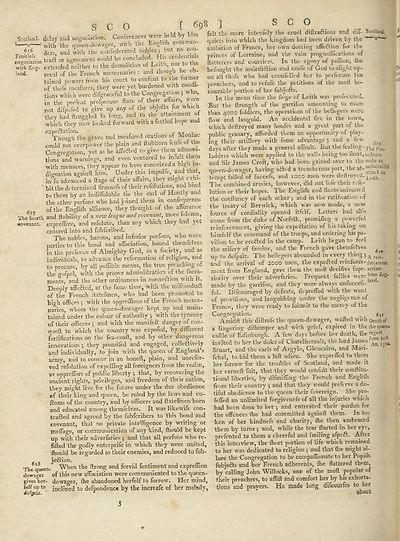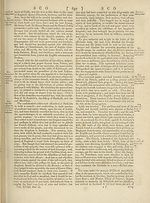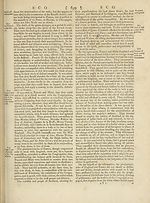Encyclopaedia Britannica, or, a Dictionary of arts, sciences, and miscellaneous literature : enlarged and improved. Illustrated with nearly six hundred engravings > Volume 18, RHI-SCR
(736) Page 698
Download files
Complete book:
Individual page:
Thumbnail gallery: Grid view | List view

vS c o
[ 698 ”J
SCO
Scotland, delay and negociation. Conferences were held by Inra
—v 'with the queen-dowager, with the Lng.ith comma.1
_ 6!6r ders, and with the confederated nobles ; but no Cc.n-
Sociadon trad or agreement could be concluded His credentials
with Eng- extended neither to the demolition of Leila, nor to the
felt the more intenfely the cruel diftraftions and dif- Scotland
land. ~ reCal of the French mercenaries : and though he ob¬
tained powers from his court to content to the former
of thefe raeafures, they were yet burdened with condi¬
tions which were disgraceful to the Congregation *, who,
in the prefent profperous date of their affairs, were
not difpofed to give up any of the objefts for which
they had ftruggled fo long, and to the attainment of
which they now looked forward with a fettled hope and
expectation. . r tvt i
Though the grave and meafured orations of Monluc
could not overpower the plain and ftubborn ftn.e of the
Congregation, yet as he alfec^ed to give them admoni¬
tions and warnings, and even ventured to m.ult them
with menaces, they appear to have conceived a high in¬
dignation againft him. Under this impulfe, and that,
in fo advanced a ftage of their affairs, they might exhi¬
bit the determined firmnefs of their refolutions, and bmc
to them by an indiffoluble tie the earl of Huntly and
the other perfons who had joined them in confequence
of the Engliih alliance, they thought of the affurance
The fourth and ftability of 1 new league and covenant, more folemn,
-covenant, expreflive, and refolute, than any which they ha \et
entered into and fubfenbed.
The nobles, barons, and inferior perfons, who were
parties to this bond and affociation, bound, themfelves
in the prefence of Almighty God, as a fociety, and as
individuals, to advance the reformation of religion, and
to procure, by all potable means, the true preaching of
the gofpel, with the proper adminiffration of the facra-
ments, and the other ordinances in connection with it.
Deeply affected, at the fame time, with the mifeonduft
of the French tlatefmen, who had been promoted to
high offices ; with the oppreffions of the French merce¬
naries, whom the queen-dowager kept up and main¬
tained under the colour of authority ; with the tyranny
of their officers •, and with the manifeft danger of con-
queff to which the country was expofed, by different
fortifications on the fea-coaft, and by oilier dangerous
innovations •, they promifed and engaged, colleftively
and individually, to join with the queen of England’s
army, and to concur in an honed., plain, and unrefer-
ved refolution of expelling all foreigners from the realm,
as oppreffors of public liberty •, that, by recovering the
ancient rights, privileges, and freedom of their nation,
they might live for the future under the due obedience
of their king and queen, be ruled by the laws and cu-
floms of the country, and by officers and ftatefmen born
and educated among themfelves. It was likewife con-
trafted and agreed by the fubferibers to this bond and
covenant, that no private intelligence by writing or
meffage, or communication of any kind, ffiould be kept
up with their adverfaries \ and that all perfons who re¬
filled the godly enterprife in which they were united,
fhould be regarded as their enemies, and reduced to fub-
je€Hon.
The queen- When the ftrong and fervid fentiment and expreflion
dowager of this new affociation were communicated to the queen-
gives her- dowager, (he abandoned herfelf to forrow. Her mind,
felf up to inc];ne(j to defpondence by the increafe of her malady,
defpedr.
quiets into which the kingdom had been driven by the
ambition of France, her own doating affe&iun for the
princes of Lorraine, and the vain prognoftications of
flatterers and courtiers. In the agony of paflion, flie
befougbt the malediction and curfe of God to alight up¬
on all thofe who had counfelled her to perfecute the
preachers, and to refufe the petitions of the moll ho¬
nourable portion of her fubjects.
In the mean time the fiege of Leith was pnofecuted.
But the ftrength of the garrifon amounting to more
than 4000 foldiers, the operations of the befiegers were
flow and languid. An accidental fire in the town,
which deftroyed many houfes and a great part of the
public granary, afforded them an opportunity of play¬
ing their artillery with fome advantage-, and a few ^
days after they made a general afiault. But the fcaling- The Pro_
ladders which were applied to the walls being too fiiort,teftants
and Sir James Croft, who had been gained over to the make an
queen-dowager, having afted a treacherous part, the at-
tempt failed of fuccefs, and 1000 men were defiroyed. Ulth<
The combined armies, however, did not lofe their refo¬
lution or their hopes. The Englifh and Scots animate d
the conftancy of each other j and in the ratification of
the treaty of Berwick, which was now made, a new
fource of cordiality opened itfelf. Letters had alio
come from the duke of Norfolk, promifing a powerful
reinforcement, giving the expectation of his taking on
him felf the command of the troops, and ordering his pa¬
vilion to be ereCted in the camp. Leith began to feel
the mifery of famine, and the French gave themfelves ^
up to defpair. The befiegers abounded in every, thing j A rein_
and the arrival of 2000 men, the expeCled reinforce-forcement
raent from England, gave them the moft decifive fupe-arrive?
riority over their adverfaries. Frequent failles 'verej™™£ng'
made by the garrifon, and they were always unfuccels- |
ful. Difcouraged by defeats, depreffed with the want
of provifions, and languifhing under the negligence of
France, they were ready to fubmit to the mercy of the
Congregation. . foi
Amidfl this diftrefs the queen-dowager, wafted with Death of
a lingering diftemper and with grief, expired in the the, queen,
caftle of Edinburgh. A few days before her death, flie^S^^
,-ited to her the duke of Chatelherault, the lord James *
Stuart, and the earls of Argyle, Glencairn, and Mari
fchal, to bid them a lall adieu. She expreffed to them
her forrow for the troubles of Scotland, and made it
her earneft fuit, that they would confult their conftitu-
tional liberties, by difmifling the French and Engbfh
from their country 5 and that they would preferve a du¬
tiful obedience to the queen their fovereign. She p.ro-
feffed an unlimited forgivenefs of all the injuries -which
had been done to her ; and entreated their pardon for
the offences fhe had committed againft them. In to¬
ken of her kindnefs and charity, ffie then embraced
them by turns ; and, while the tear ftarted in her eye,
prefented to them a cheerful and fmiling afpeft. After
this interview, the fhort portion of life which remained
to her was dedicated to religion ; and that (he might al¬
lure the Congregation to be compaffionate to her Popilh
fubjefts and her French adherents, fhe flattered them,
by calling John Willocks, one of the moft popular of
their preachers, to affift and comfort her by his exhorta¬
tions and prayers. He made long difeourfes to her
about
5
[ 698 ”J
SCO
Scotland, delay and negociation. Conferences were held by Inra
—v 'with the queen-dowager, with the Lng.ith comma.1
_ 6!6r ders, and with the confederated nobles ; but no Cc.n-
Sociadon trad or agreement could be concluded His credentials
with Eng- extended neither to the demolition of Leila, nor to the
felt the more intenfely the cruel diftraftions and dif- Scotland
land. ~ reCal of the French mercenaries : and though he ob¬
tained powers from his court to content to the former
of thefe raeafures, they were yet burdened with condi¬
tions which were disgraceful to the Congregation *, who,
in the prefent profperous date of their affairs, were
not difpofed to give up any of the objefts for which
they had ftruggled fo long, and to the attainment of
which they now looked forward with a fettled hope and
expectation. . r tvt i
Though the grave and meafured orations of Monluc
could not overpower the plain and ftubborn ftn.e of the
Congregation, yet as he alfec^ed to give them admoni¬
tions and warnings, and even ventured to m.ult them
with menaces, they appear to have conceived a high in¬
dignation againft him. Under this impulfe, and that,
in fo advanced a ftage of their affairs, they might exhi¬
bit the determined firmnefs of their refolutions, and bmc
to them by an indiffoluble tie the earl of Huntly and
the other perfons who had joined them in confequence
of the Engliih alliance, they thought of the affurance
The fourth and ftability of 1 new league and covenant, more folemn,
-covenant, expreflive, and refolute, than any which they ha \et
entered into and fubfenbed.
The nobles, barons, and inferior perfons, who were
parties to this bond and affociation, bound, themfelves
in the prefence of Almighty God, as a fociety, and as
individuals, to advance the reformation of religion, and
to procure, by all potable means, the true preaching of
the gofpel, with the proper adminiffration of the facra-
ments, and the other ordinances in connection with it.
Deeply affected, at the fame time, with the mifeonduft
of the French tlatefmen, who had been promoted to
high offices ; with the oppreffions of the French merce¬
naries, whom the queen-dowager kept up and main¬
tained under the colour of authority ; with the tyranny
of their officers •, and with the manifeft danger of con-
queff to which the country was expofed, by different
fortifications on the fea-coaft, and by oilier dangerous
innovations •, they promifed and engaged, colleftively
and individually, to join with the queen of England’s
army, and to concur in an honed., plain, and unrefer-
ved refolution of expelling all foreigners from the realm,
as oppreffors of public liberty •, that, by recovering the
ancient rights, privileges, and freedom of their nation,
they might live for the future under the due obedience
of their king and queen, be ruled by the laws and cu-
floms of the country, and by officers and ftatefmen born
and educated among themfelves. It was likewife con-
trafted and agreed by the fubferibers to this bond and
covenant, that no private intelligence by writing or
meffage, or communication of any kind, ffiould be kept
up with their adverfaries \ and that all perfons who re¬
filled the godly enterprife in which they were united,
fhould be regarded as their enemies, and reduced to fub-
je€Hon.
The queen- When the ftrong and fervid fentiment and expreflion
dowager of this new affociation were communicated to the queen-
gives her- dowager, (he abandoned herfelf to forrow. Her mind,
felf up to inc];ne(j to defpondence by the increafe of her malady,
defpedr.
quiets into which the kingdom had been driven by the
ambition of France, her own doating affe&iun for the
princes of Lorraine, and the vain prognoftications of
flatterers and courtiers. In the agony of paflion, flie
befougbt the malediction and curfe of God to alight up¬
on all thofe who had counfelled her to perfecute the
preachers, and to refufe the petitions of the moll ho¬
nourable portion of her fubjects.
In the mean time the fiege of Leith was pnofecuted.
But the ftrength of the garrifon amounting to more
than 4000 foldiers, the operations of the befiegers were
flow and languid. An accidental fire in the town,
which deftroyed many houfes and a great part of the
public granary, afforded them an opportunity of play¬
ing their artillery with fome advantage-, and a few ^
days after they made a general afiault. But the fcaling- The Pro_
ladders which were applied to the walls being too fiiort,teftants
and Sir James Croft, who had been gained over to the make an
queen-dowager, having afted a treacherous part, the at-
tempt failed of fuccefs, and 1000 men were defiroyed. Ulth<
The combined armies, however, did not lofe their refo¬
lution or their hopes. The Englifh and Scots animate d
the conftancy of each other j and in the ratification of
the treaty of Berwick, which was now made, a new
fource of cordiality opened itfelf. Letters had alio
come from the duke of Norfolk, promifing a powerful
reinforcement, giving the expectation of his taking on
him felf the command of the troops, and ordering his pa¬
vilion to be ereCted in the camp. Leith began to feel
the mifery of famine, and the French gave themfelves ^
up to defpair. The befiegers abounded in every, thing j A rein_
and the arrival of 2000 men, the expeCled reinforce-forcement
raent from England, gave them the moft decifive fupe-arrive?
riority over their adverfaries. Frequent failles 'verej™™£ng'
made by the garrifon, and they were always unfuccels- |
ful. Difcouraged by defeats, depreffed with the want
of provifions, and languifhing under the negligence of
France, they were ready to fubmit to the mercy of the
Congregation. . foi
Amidfl this diftrefs the queen-dowager, wafted with Death of
a lingering diftemper and with grief, expired in the the, queen,
caftle of Edinburgh. A few days before her death, flie^S^^
,-ited to her the duke of Chatelherault, the lord James *
Stuart, and the earls of Argyle, Glencairn, and Mari
fchal, to bid them a lall adieu. She expreffed to them
her forrow for the troubles of Scotland, and made it
her earneft fuit, that they would confult their conftitu-
tional liberties, by difmifling the French and Engbfh
from their country 5 and that they would preferve a du¬
tiful obedience to the queen their fovereign. She p.ro-
feffed an unlimited forgivenefs of all the injuries -which
had been done to her ; and entreated their pardon for
the offences fhe had committed againft them. In to¬
ken of her kindnefs and charity, ffie then embraced
them by turns ; and, while the tear ftarted in her eye,
prefented to them a cheerful and fmiling afpeft. After
this interview, the fhort portion of life which remained
to her was dedicated to religion ; and that (he might al¬
lure the Congregation to be compaffionate to her Popilh
fubjefts and her French adherents, fhe flattered them,
by calling John Willocks, one of the moft popular of
their preachers, to affift and comfort her by his exhorta¬
tions and prayers. He made long difeourfes to her
about
5
Set display mode to:
![]() Universal Viewer |
Universal Viewer | ![]() Mirador |
Large image | Transcription
Mirador |
Large image | Transcription
Images and transcriptions on this page, including medium image downloads, may be used under the Creative Commons Attribution 4.0 International Licence unless otherwise stated. ![]()
| Permanent URL | https://digital.nls.uk/193028275 |
|---|
| Attribution and copyright: |
|
|---|
| Description | Ten editions of 'Encyclopaedia Britannica', issued from 1768-1903, in 231 volumes. Originally issued in 100 weekly parts (3 volumes) between 1768 and 1771 by publishers: Colin Macfarquhar and Andrew Bell (Edinburgh); editor: William Smellie: engraver: Andrew Bell. Expanded editions in the 19th century featured more volumes and contributions from leading experts in their fields. Managed and published in Edinburgh up to the 9th edition (25 volumes, from 1875-1889); the 10th edition (1902-1903) re-issued the 9th edition, with 11 supplementary volumes. |
|---|---|
| Additional NLS resources: |
|

